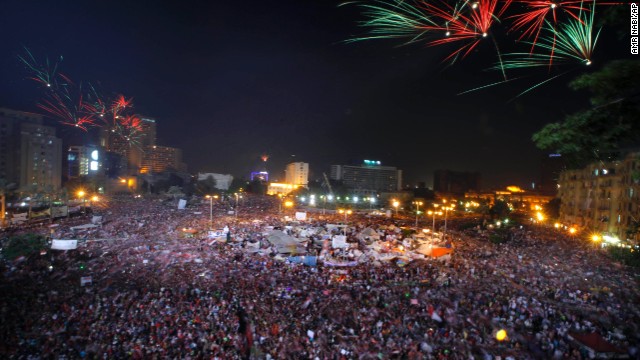- Egypt's top military leader announces Wednesday night that President Mohamed Morsy has been removed from power
- Head of Egypt's constitutional court will be temporary president until new constitution is drawn up and new elections can be held
- The military demanded that Morsy share power with opponents after anti-government protests
- Morsy, elected last year, refused to comply; mass protests continue to support him
- Refresh this page for the latest news we're seeing and hearing. Catch up with our full story here.
[Updated at 11:52 p.m. ET, 5:52 a.m. in Egypt] Some 40 anti-Morsy protesters are planning to meet with cleaning equipment to polish up their former protest campground, Tahrir Square. They have invited over 2,000 people to join them on Facebook.
[Updated at 11:03 p.m. ET, 5:30 a.m. in Egypt] CNN's Jake Tapper outlines some fine points of Obama's reaction to the Egyptian military's actions:
President Obama’s statement Wednesday evening about the Egyptian military’s seizure of power from President Mohamed Morsy is as telling for what he doesn’t say as for what he does: he doesn’t mention the word “coup.” He doesn’t call upon the Egyptian military to restore power to the “democratically elected civilian government,” but rather to a“democratically elected civilian government” - in other words, it need not be Morsy’s.
The thinking of the president and senior Obama administration officials, according to a knowledgeable source, is that while the administration is not explicitly supporting the removal of Morsy from power - it expressly did not support the move - it is seeking to now push the Egyptian military in a direction.
If the Obama administration were to use the word “coup.” that would have legal ramifications that would result in the end of U.S. aid. If White House officials were to pull the plug completely, they would be removing themselves from the picture altogether.
[Updated at 10:19 p.m. ET, 4:19 a.m. in Egypt] CNN's Ben Wedeman, who spent time at a pro-Morsy rally in Cairo on Wednesday evening, reported he spoke to one protester who said he felt demonstrators would stay there "until Mohamed Morsy is once again president of Egypt."
Wedeman recalled the exchange early Thursday after leaving the pro-Morsy rally to go to the larger gathering at Cairo's Tahrir Square, where people still were celebrating Morsy's ouster.
Wedeman said that although much focus is on the joy and excitement at Tahrir Square, "there's a significant portion of the Egyptian population – (although) I wouldn’t suggest it’s a majority – who are very upset at what has happened."
Wedeman, a CNN senior international correspondent who'd previously served as CNN's Cairo bureau chief, said it appeared the overall mood in Egypt would be different than 2011, when then-President Hosni Mubarak was deposed. In 2011, Wedeman said, Mubarak's supporters kept a low profile for months.
"There's not going to be that quiet after the storm this time around," Wedeman said.
[Updated at 10:06 p.m. ET, 4:06 a.m. in Egypt] Get ready for an extremist backlash to Morsy's ouster, says Mohammed Ayoob, Michigan State University professor emeritus of international relations.
"The major lesson that Islamists in the Middle East are likely to learn from this episode is that they will not be allowed to exercise power no matter how many compromises they make in both the domestic and foreign policy arenas," Ayoob wrote for a CNN.com opinion piece. "This is likely to push a substantial portion of mainstream Islamists into the arms of the extremists who reject democracy and ideological compromise."
CNN's Ben Wedeman, reporting from Cairo, also said there's a danger that some members of the Muslim Brotherhood will break from the main group and "challenge (Egypt's new leaders) with violence."
They may take the attitude of "we tried to play the game, our leaders were jailed, our media have been shut down ... so we’re going to destroy the system," said Wedeman, who is a CNN senior international correspondent and had previously been CNN's Cairo bureau chief.
[Updated at 9:23 p.m. ET, 3:23 a.m. in Egypt] U.N. Secretary-General Ban Ki-moon has echoed Obama's call for a quick return to civilian rule. He appealed for "calm, non-violence, dialogue and restraint."
[Updated at 8:24 p.m. ET, 2:24 a.m. in Egypt] More about arrests in Egypt, from CNN's interview with Muslim Brotherhood spokesman Gehad El-Haddad:
– Morsy was arrested by presidential guards at their headquarters, and is being "cut off" from the world, El-Haddad told CNN. "They cut all his access, all his calls. No one is meeting him," the spokesman said.
– Members of Morsy's presidential team also were arrested, El-Haddad said.
– The head of Egypt's Freedom and Justice Party and the deputy leader of the Muslim Brotherhood also were arrested, according to El-Haddad.


No comments:
Post a Comment